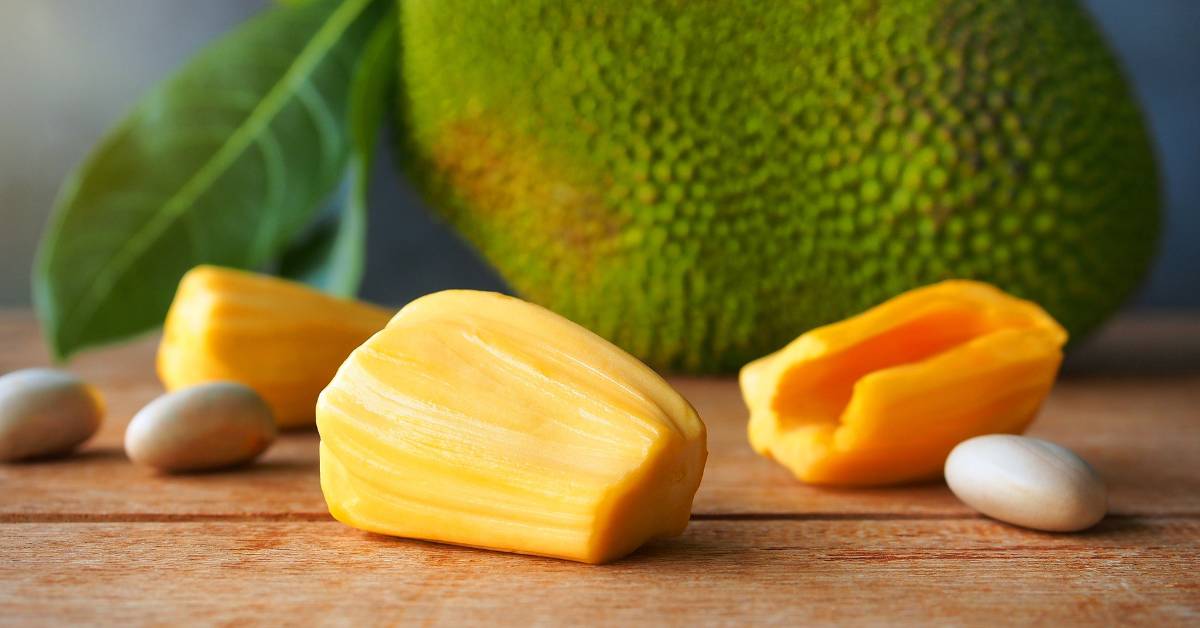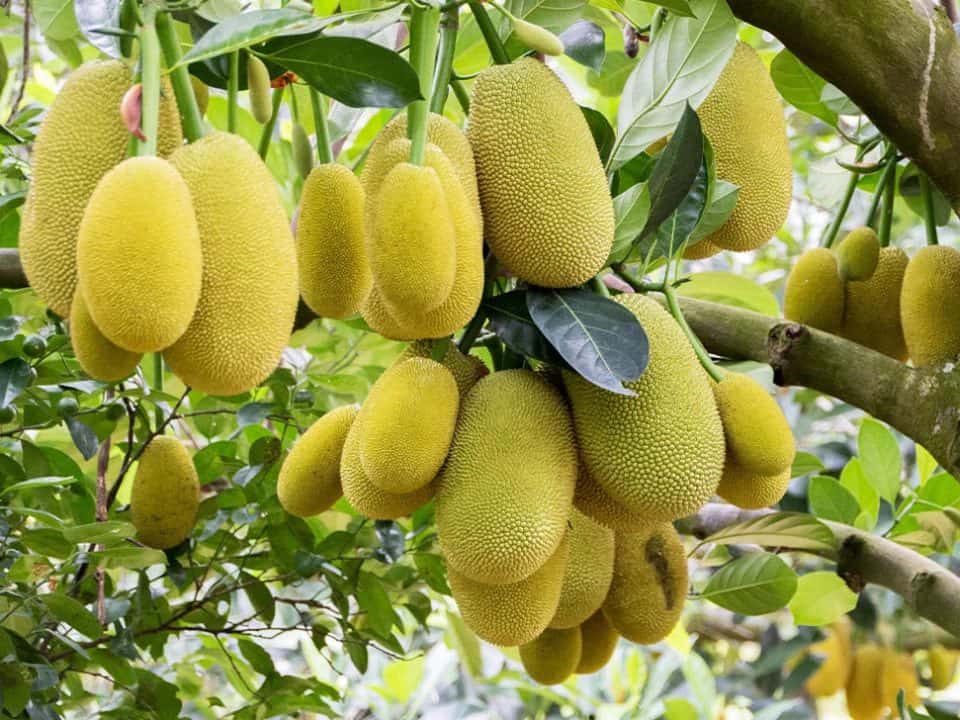
Nghe Jackfruit: A High-Value Crop for Farmers in Vietnam
26/04/2023In recent years, the popularity of jackfruit has skyrocketed due to its distinctively sweet taste and versatility in various culinary applications. But did you know that this unique tropical fruit is also packed with essential nutrients and may offer numerous health benefits?
In this article, we will explore the advantages of incorporating jackfruit into your diet. From its potential ability to improve digestion to its contribution to a healthier immune system, we’ll cover all the amazing benefits of this fruit that make it worth adding to your meal plan.
What Is Jackfruit?

Originating in South India, jackfruit is a peculiar fruit that grows in tropical regions worldwide. As a member of the Moraceae plant family, along with figs, mulberries, and breadfruit, it features a spiky green or yellow outer skin.
One of the most fascinating aspects of jackfruit is its enormous size. It is considered the largest tree fruit globally, with some weighing up to 80 pounds (35 kg). It has a unique and subtle fruity flavor, often compared to a combination of apples, pineapples, mangoes, and bananas.
Due to its texture, which closely resembles shredded meat, jackfruit is a common substitute for meat for vegans and vegetarians. Additionally, in developing countries at risk of starvation, this fruit’s ability to endure tropical climates makes it a valuable source of calories and carbs.
Although once mainly consumed in tropical areas, jackfruit is now becoming increasingly available worldwide, including in the US during the summer season. Its flesh, or fruit pods, is the most commonly consumed part, which can be enjoyed ripe or unripe and used in sweet and savory dishes such as curries and desserts. Even the seeds are edible.
In summary, jackfruit is a versatile and exotic tropical fruit with a subtle sweet flavor that can be enjoyed in many ways.
Jackfruit Is Packed With Nutrients
Jackfruit is not only delicious but also a powerhouse of nutrients. One cup of sliced jackfruit (165 grams) contains 155 calories, mostly from carbs, and also provides three grams of protein and three grams of fiber.
Jackfruit is also rich in essential vitamins and minerals, including vitamin A, vitamin C, riboflavin, magnesium, potassium, copper, and manganese.
One cup of sliced fruit provides the following nutrients:
- Calories: 155
- Carbs: 40 grams
- Fiber: 3 grams
- Protein: 3 grams
- Vitamin A: 10% of the RDI
- Vitamin C: 18% of the RDI
- Riboflavin: 11% of the RDI
- Magnesium: 15% of the RDI
- Potassium: 14% of the RDI
- Copper: 15% of the RDI
- Manganese: 16% of the RDI
What sets jackfruit apart from other fruits is its high protein content, which is unique for a fruit.
Jackfruit contains more than three grams of protein per cup, whereas other fruits such as apples and mangoes contain 0-1 grams of protein per cup.
Additionally, jackfruit is packed with various antioxidants that contribute to its numerous health benefits.
It May Benefit Blood Sugar Control
To aid in blood sugar management, jackfruit has several properties.
Due to the fiber it provides, jackfruit has a fairly low glycemic index (GI), which means it does not cause blood sugar levels to rise quickly after eating. This property has been linked to promoting better blood sugar control in diets that incorporate low-GI foods.
In addition, jackfruit contains protein that can help prevent rapid increases in blood sugar levels after meals. Several studies have shown that jackfruit extract and jackfruit leaf extract may improve blood sugar levels in adults and diabetic mice, respectively. These beneficial effects may be attributed to the flavonoid antioxidants found in jackfruit, which can promote balanced blood sugar levels.
Although these findings are promising, more research on the effects of consuming fresh jackfruit is needed to confirm its potential benefits for blood sugar management.
Overall, jackfruit’s low GI, fiber, protein, and antioxidants may help promote better blood sugar control.
It May Protect Against Disease
Jackfruit is high in a few powerful antioxidants that provide various health benefits, including a reduced risk of several diseases.
Antioxidants help safeguard your cells from oxidative stress and inflammation, both of which can stem from damage caused by unstable molecules known as free radicals.
Here’s an overview of the antioxidants that are most abundant in jackfruit:
- Vitamin C: Jackfruit contains high amounts of vitamin C, which may help prevent the inflammation that can lead to chronic diseases like heart disease and cancer.
- Carotenoids: Carotenoids have been shown to help lower inflammation and reduce the risk of various chronic diseases, such as type 2 diabetes and heart disease.
- Flavanones: Flavanones contain anti-inflammatory properties that may help lower blood sugar, blood pressure and cholesterol levels — important factors in reducing the risk of type 2 diabetes and heart disease.
SUMMARY Jackfruit is rich in a range of antioxidants that could potentially aid in the prevention of chronic illnesses, such as heart disease and diabetes.
Other Potential Health Benefits
Jackfruit is said to have several other health benefits that have not been studied specifically.
- Immune health: Jackfruit’s content of immune-boosting vitamins A and C may help prevent illnesses. Eating this fruit is also claimed to be helpful for reducing the risk of viral infections.
- Preventing skin problems: This fruit provides several nutrients and antioxidants, such as vitamin C, that may improve skin health. There is anecdotal evidence that eating it may slow the aging of your skin.
- Heart health: Jackfruit may have the potential to reduce the risk of heart disease due to its content of potassium, fiber and antioxidants.
The roots and extracts of jackfruit have been utilized in traditional Indian and Sri Lankan medicine for treating ailments such as diarrhea, asthma, and stomach ulcers. However, there is no scientific evidence to support these claims.
Despite the lack of scientific evidence for these reported benefits, including jackfruit in your diet may still be a worthwhile option to enhance your overall health.
SUMMARY Although there is no scientific evidence to support the reported potential health benefits of jackfruit, it is still worth considering including it in your diet for its nutritional value.
Risks of Eating Jackfruit
While most people can safely consume jackfruit, some individuals may need to limit or avoid it. Those allergic to birch pollen may be particularly susceptible to an allergic reaction. Additionally, because of its potential to lower blood sugar levels, individuals with diabetes may need to adjust their medication dosages if they regularly consume jackfruit.
Despite these considerations, there have been no reports of any significant side effects associated with eating jackfruit, and it is generally considered safe for most people.
SUMMARY Eating jackfruit is generally safe for most people, except for those who have an allergy to it.
How to Eat It
Jackfruit is a versatile fruit that can be eaten either raw or cooked. To prepare it, you should first cut it in half and remove the yellow fruit pods and seeds from the skin and core using either a knife or your hands. It is important to note that the white, fibrous part inside of the fruit is sticky, so wearing gloves while handling it may be helpful.
Jackfruit can be consumed plain or cooked in both sweet and savory dishes, depending on its ripeness. The unripe fruit generally tastes better in savory recipes, while the ripe fruit is ideal for desserts.
Fresh jackfruit can be challenging to find in grocery stores, especially when it is not in season. However, it is often available canned, which is a convenient option.
Vegetarians and vegans often use jackfruit as a meat substitute because of its texture. For example, you can use the fruit as a meat replacement in jackfruit tacos by cooking it and then combining it with vegetables and seasonings.
Moreover, you can add jackfruit to curries or soups, and the ripe fruit tastes fantastic when added to yogurt or oatmeal.
Jackfruit seeds are also edible and can be boiled or roasted and combined with seasonings. You can even make hummus with the seeds.
SUMMARY Jackfruit is quite versatile. It can be eaten raw, cooked, ripe or unripe and tastes great in a variety of sweet and savory dishes.
The Bottom Line
There are many reasons why jackfruit is beneficial for your health. It is loaded with nutrients and antioxidants and has the potential to improve blood sugar control, among other benefits.
Incorporating jackfruit into your diet is simple, whether you choose to eat it on its own or as an ingredient in various dishes. As a meat substitute, it is a great option for vegans and vegetarians.
Fresh jackfruit can be found more easily during the summer season, but canned jackfruit is available year-round in most grocery stores.
Adding jackfruit to your diet is a great way to try something new and healthy. It’s a unique food that’s definitely worth experimenting with.
Feel free to contact us.
Hotline:
- Vietnamese: +84.986.386.886
- English: +84.982.062.486
- Chinese: +84.961.926.897




